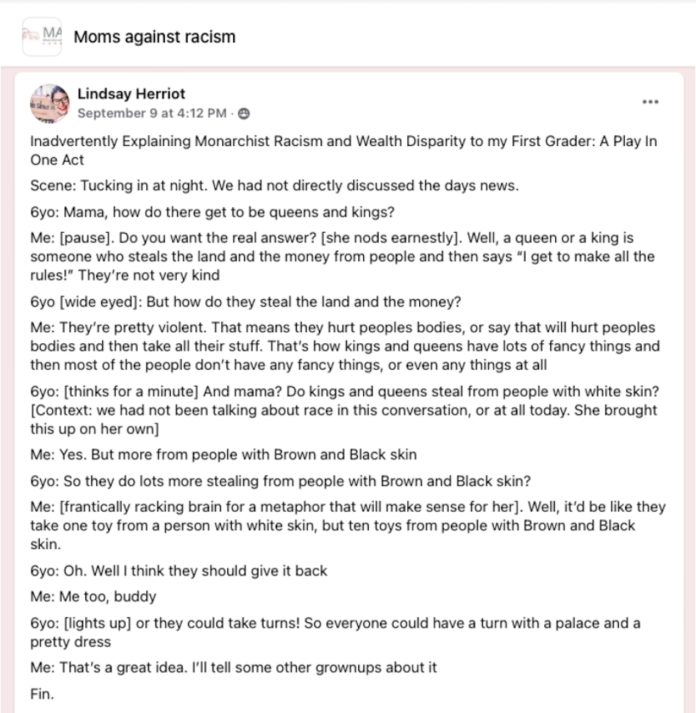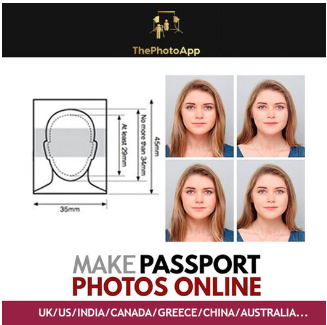As a white settler mother or father, I imagine that it’s my duty to talk to my daughter about race and colonialism, and I strive to take each alternative I get. She has marched with me at rallies in help of Indigenous land rights, particularly the Wet’suwet’en in BC and the folks of Grassy Narrows First Nation in northern Ontario. We’ve walked along with hundreds of individuals to honour the kids who died in residential colleges and learn highly effective books about the topic, like Shi-shi-et-ko by Nicola Campbell and Stolen Words by Melanie Florence.
But these conversations and actions are not all the time straightforward. I typically discover myself stumbling via them, questioning myself and questioning if I’m doing sufficient, saying sufficient or telling my child an excessive amount of. But increasingly as my daughter will get older—she is six now—I discover that she is and asking questions. She is commonly prepared to spot racism and injustice, she is starting to know what colonialism means, and he or she asks about these unkind colleges that kids had been pressured to go to.
As I used to be feeling unsure about whether or not I ought to talk to my daughter about the Queen’s death—in any case, she nonetheless barely is aware of that the Queen existed in any respect—I got here throughout a social media submit by Lindsay Herriot, a mom of three younger kids and a member of the fb group Moms Against Racism.
Photo: Moms Against Racism on Facebook
Herriot, a white mother or father, usually posts glimpses of her household’s anti-racist conversations on the group, like this one she had together with her six-year-old after the death of the Queen. Reading her dialog together with her daughter helped push me to have the dialog with my daughter, too. And that is so usually the case; studying and listening to others from all backgrounds who are working to dismantle colonialism helps push us to do higher, as a mother or father and as an individual.
“I write and share these vignettes as one-act plays to encourage other parents, and especially other white parents, to take up these conversations with their own kids,” says Herriot. “And I try to include in them the humility that how our family is approaching this is by no means the best or ideal way for these conversations to go. Rather, they’re an imperfect snippet of how one family is trying. And hopefully, it will spark the confidence and creativity in other parents.”
There is a rising consciousness of how vital it’s to problem colonialism and racism in all its varieties. Being part of teams like Moms Against Racism and Standing Up for Racial Justice is a method parents can study and problem themselves. I chatted with Kerry Cavers, the Black mom of three who based Moms Against Racism two-and-a-half years in the past after the homicide of George Floyd. It is now a volunteer-led advocacy group in addition to a mother or father group (whereas they at present join on Facebook, there are plans to transfer to a brand new discussion board quickly), and supply coaching in “How to Raise an Anti-Racist Child.”
What impressed Cavers is that these are conversations parents in the group will probably be having from the time kids are very younger, till they are teenagers, younger adults and past. “I see Moms Against Racism as an opportunity for a generation of anti-racist kids to be raised,” she says. “We know that as parents, as people in mothering roles guiding children, we have a very unique opportunity to influence the future.” Cavers shared her finest suggestions for speaking to kids about racism and colonialism.
Every mother or father needs to be having these conversations
“I think that parents, all parents, no matter what race, have a responsibility to be talking about racism and colonization,” says Cavers. “Racism is not just a racialized person’s problem. It’s a white person’s problem too—it just impacts each of us differently. And we have different responsibilities and accountabilities within dismantling systemic racism.”
Listen to these with lived expertise
For households who haven’t been on the receiving finish of racism or colonization, Cavers says to look in direction of these individuals who do and take a look at to see what they’re seeing. “Look at Facebook pages like Moms Against Racism or Parenting Decolonized or Untigering, more so the BIPOC people in those spaces that are giving that parenting advice,” she says. “They’ll give you those perspectives, that insight, that not having that lived experience, you may miss.” Prioritize the voices of Indigenous peoples to study about settler colonialism in Canada, and pay attention to individuals who have been displaced, disrupted and had to struggle for independence in international locations of the world South.
Ensure this sort of considering turns into second nature
While many parents could really feel daunted by the thought of speaking about massive subjects like the Queen’s death, racism or colonization, Cavers says the approach to make it simpler is to be having these chats all the time. “That way, it becomes just a matter of your family’s values,” she explains. “You may not have all the answers or know all the information, but if you’re having bite-size conversations here and there, you’re learning and growing alongside your children, and learning where they’re at, and how ready they are to receive certain information.”
Herriot, who shared the one-act play together with her daughter, says she’s been having these conversations since her oldest youngster was an toddler. “Even as a tiny newborn, we were talking to her and explaining to her what’s going on in the world and how we as white people need to show up and get loud about anti-racism. Because anti-racism conversations have always been part of the fabric of our family, they’ve evolved naturally. There’s never been one Big Moment where we’ve needed to introduce race or white supremacy because it’s always just been there.”
While I used to be a bit in awe of the dialog Herriot had together with her first grader, it’s the direct results of Herriot’s long-term dedication to educating her youngster about racism: “In the vignette I posted about the Queen, my six-year-old brought up a racial critique of monarchy all on her own,” she says. “I think that’s because she’s used to a racial justice dimension being integrated into our conversations about all sorts of topics.”
Follow your child’s lead
For parents simply beginning out, Cavers recommends asking open-ended questions. “Ask them things like, ‘So what do you think about …?’ or ‘What have you heard about …?’ And let them tell you what they know,” she says.
You can then observe up by asking if they’ve any questions. “Then they’re asking you the information that they need to know, at an age-appropriate level, because that’s where they’re at,” she says. “As parents, we have so much more understanding and context that I think we scare ourselves that we need to tell our kids everything all at once.” If we let our kids lead, she explains, we will then let go of the concern of oversharing and begin to perceive what our particular person kids can and might’t deal with.
It’s OK for those who are nonetheless studying, too
It’s completely acceptable to enter these massive conversations with kids with out being a subject-matter knowledgeable your self. “Telling our kids that we don’t have all of the answers, we’re learning this too, is totally OK,” says Cavers. “It allows for that openness for learning to happen both ways, because now a lot of kids are learning some of this stuff in school and they may bring something home that you don’t know, and it’s an opportunity to have that conversation and that learning together.” It’s good for them to perceive that nobody has all the solutions.
Herriot agrees: “Talking about race all the time removes a lot of pressure to get it right or perfect in any one conversation. We can move through these topics bravely because it’s lots of little conversations over time. We don’t have to panic that it wasn’t perfect—we just have to keep having the conversation, over and over, all the time.”
Build on common ideas
For many Black, Brown and Indigenous folks, conversations about racism and colonization have all the time been an unavoidable a part of life, however for a lot of white households, this may increasingly look like one thing new. Yet the chats will construct on elementary ideas that you simply’ve already been coping with–simply with a special, extra targeted lens.
“They’re building-block concepts—friendship, and empathy, and generosity, and accountability, and consent,” says Cavers. “Those are all concepts that are universal, they apply to equipping our children to be able to identify injustices that are happening, and to be able to uphold their values.” She suggests constructing on experiences that are acquainted to your kids, round sharing toys, taking part in collectively, the emotions that include being included or excluded.
It’s much less about your youngster’s age and extra about their expertise
Cavers presents a reminder that a lot goes to be distinctive to every particular person youngster. “Some children, through either lived experience or just their own personal characteristics, are going to be more mature and are going to appreciate being spoken to with a higher level of nuance. And then some kids need to really have analogies and have that related to their own personal experience to be able to understand it,” she says.
Her personal kids are 9, seven, and 5. “Because we’re having these conversations all the time, even my five-year-old can handle a higher level of nuance, and they can connect those dots,” she says. “If I was just starting having these conversations, I would probably temper down my language and kind of feel things out.”
Find a various group of like-minded parents
For Cavers, the energy of Moms Against Racism is that it permits for parents of all backgrounds to study from one another. “I think what I’m most proud of is the culture that we’ve created within the MAR community,” she says. “We are actively demonstrating what it could look like to be part of an inclusive group opposing white supremacy, where we are having difficult conversations. We can do so without attacking or belittling each other. We can show up with humility and say ‘I was wrong, I made a mistake,’ and not be ridiculed for not knowing. There’s accountability but no attacking. We really focus on that relationship being the way forward.”



